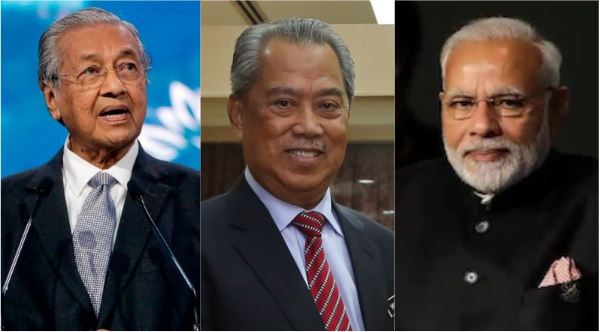Malaysia has realised that it is not prudent to lock horns over India, and that too on an issue like Kashmir. Last year, former Malaysian Prime Minister Mahathir Mohamad’s nasty comments after abrogation of Article 370 had led to New Delhi imposing palm oil import restrictions and thus punishing Kuala Lumpur. Within Malaysia, there is a general understanding that irking India over Kashmir wasn’t the most prudent move.
Now, the former Malaysian Prime Minister Mahathir Mohamad himself made a confession during an exclusive interview with WION editor, Palki Sharma.
When asked whether the relations between India and Malaysia deteriorated because of his comments on Kashmir, Mahathir replied, “Well, it did because of my remarks on Kashmir. But, other than that the relationship was very good, even under my leadership.”
"It is not about supporting Pakistan, it is about the people of Kashmir…": Former Malaysian PM @chedetofficial talks to @palkisu on his controversial remarks on Jammu and Kashmir#MahathirMohamadOnWION pic.twitter.com/juoGkmyyu2
— WION (@WIONews) August 7, 2020
This year, there is a remarkable change in the Malaysian outlook. On the first anniversary of the abrogation of Article 370 revoking the special status of Jammu & Kashmir, Turkey and Pakistan once again continued with anti-India remarks. But Malaysia led by its new Prime Minister Muhyiddin Yassin made no such remarks.
The new Malaysian Prime Minister, Muhyiddin Yassin, wanted to establish strong ties with India ever since he stormed to power earlier this year. Wee Ka Siong, a prominent face in the Yassin cabinet and the incumbent Minister of Transport had hinted at Malaysia’s aspirations to seek rapprochement with India as soon as Yassin came to power.
He had said that improving ties with India was a priority as the Malaysian palm oil producers were suffering due to India’s move to restrict palm oil imports from Malaysia. “Can we just renegotiate? It’s for my country as well as for my people,” Wee told Reuters. “Since we are a new government, let the PM, the new government deal with it. We treasure the friendship with India.”
Earlier this year, the Modi government has restricted imports of refined palm oil and palmolein. The move was aimed at Malaysia as the former Malaysian Prime Minister, Mahathir was constantly taking an anti-India line.
Then Ministry of External Affairs spokesperson Raveesh Kumar had then said, “It is not a country-specific restriction. It is product specific. Imports of refined palm oil has not been stopped. There will just be some procedures that would be put in place….The state of relationship (with a trade partner) is one of the factors that businesses look at before doing business.”
India’s decision to restrict palm oil imports had resulted in a lot of pain for Malaysia, as the Southeast Asian country’s exports to India had gone down drastically by 94 per cent from January to April.
It did not take long for Malaysia to realise its mistakes. And now relations between the two countries seem to be getting back on track. External Affairs Minister, Dr. S. Jaishankar conversed with Malaysia’s new Foreign Minister Hishammuddin Hussein, as soon as the latter assumed office. India’s High Commissioner to Malaysia, Mridul Kumar has also met the Malaysian Foreign Minister several times.
Trade ties have started blossoming again, as Malaysia has increased the imports of sugar and rice from India, while India has restarted purchasing Malaysian palm oil. In the COVID context too, India helped Malaysia by allowing the export of Hydroxychloroquine and Paracetamol to Malaysia.
The regime change in Malaysia is turning out to be quite a windfall for India. Firstly, India stands to gain more goodwill in a Southeast Asian country being bullied by Beijing in the South China Sea and secondly, India gets to test Muhyiddin Yassin’s friendship by demanding the prompt extradition of controversial Islamic preacher Zakir Naik who is currently in Malaysia.
Yassin is known to be favourable towards Naik’s extradition from the time when he was Malaysia’s Interior Minister. With Yassin at the helm of affairs in Malaysia, Modi government has the opportunity to put more pressure on Malaysia and get Naik extradited.
Malaysia has learnt its lessons. And this marks a massive turning point in India’s bargaining power. India has successfully moulded the foreign policy of a country by using its economic heft.
